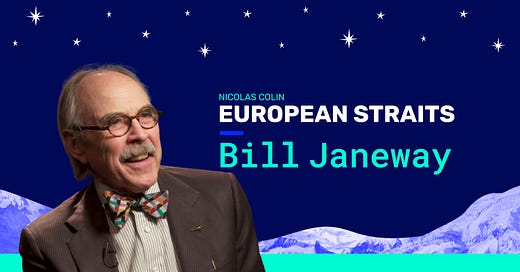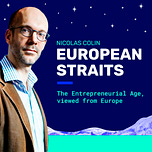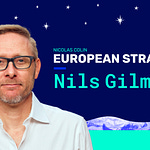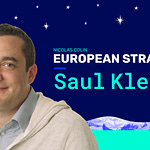The Agenda 👇
Bill Janeway’s vision of the state of the world 🎧
Should investors partner with corporates in their efforts at reinventing themselves?
Jeff Bezos is stepping down. A few thoughts on his life and legacy.
Lessons shared by my friend Martin Schmidbaur on communications.
Jerry Neumann’s “productive uncertainty”: Tesla as a business case.
🎧 I recently sat down for a conversation with Bill Janeway, an economist, faculty member at Cambridge University, and author of the landmark book Doing Capitalism in the Innovation Economy.
It’s a book that really has had a profound influence on me—basically containing everything you need to know about how venture capital came to be and why it’s so relevant today in the context of the transition to the digital economy.
Bill’s long career in venture capital, primarily with Warburg Pincus, and his academic work let him comment on today’s economy from both a business and an institutional perspective. And I consider myself, and the world at large, really, to be quite lucky that he is also such an affable person and generous with his time and thinking.
Our conversation spanned how he’s experienced the very strange year that was 2020, his thesis regarding the retreat from hyperglobalization, the consequences of Joe Biden’s election on America, the world at large, & the tech industry specifically, how he sees Europe’s future, and much more.
👉 Listen to our podcast by using the player above or go listen on Apple Podcasts or Spotify 🎧
🎊 Co-Investing in Corporate Reinvention
I’ve never hidden my skepticism regarding corporate venture capital, that idea that somehow corporations can invest in outside startups as a solution to their need to innovate and find new business models. I’m skeptical because the alignment of interests is oftentimes non-existent, if not impossible, and as someone who works with early-stage founders on a daily basis, I’ve often seen it quickly turn into a case of ‘be careful what you wish for’.
A different approach to that same problem, however, could be having outside investors such as PE or VC firms brought into a corporation’s internal efforts at reinventing themselves. This is similar to what was seen with KKR’s investment in Bertelsmann, which led to the successful development of BMG Rights Management in the music industry.
I like this idea because unlike corporate venture capital, it’s an approach that can much more easily align the two parties’ interests. Because both have their own (significant) strengths, finding and working toward a shared goal becomes much more viable. And I wonder if my readers have any other examples that come to mind of similar experiments, whether successful or not?
👉 My interest in entrepreneurial investing continues in Co-Investing in Corporate Reinvention.
🧗 11 Notes on Jeff Bezos
The big piece of news in the tech world last week was that one of the contenders for greatest CEO of all time, Jeff Bezos, would be stepping down at Amazon later this year. Bezos will become Amazon’s Executive Chairman, handing the reins over to the man who’s built up Amazon’s increasing returns on the Southern Side of the business, current CEO of AWS Andy Jassy.
I’ll admit that coming up with an “11 Notes” for Jeff Bezos wasn’t particularly hard, as his 25+ year reign at Amazon has provided more than enough material for anyone who enjoys thinking about how businesses can be built and run. From his ability to allocate capital, to control his shareholders and even his decision to base the company in Seattle, he’s given a master class on being a CEO.
Of course, the one thing that pretty much everyone knows about Bezos is his obsession with constantly improving the customer experience. Yes, that made him an extremely difficult taskmaster (as Steve Yegge recounted brilliantly regarding the birth of AWS), but it also allowed him to create the first hybrid tech giant. And yet he still managed to find time to drive Donald Trump absolutely crazy 😉
👉 Read more in 11 Notes on Jeff Bezos.
📸 Martin Schmidbaur on Communications
As I mentioned last week, part of our work with The Family’s current batch of startups is having conversations with effective operators, and I was glad to recently have my friend Martin Schmidbaur of Milltown Partners come in to talk about communications. Similar to business strategy, one could question the need for early-stage founders to think about communications; but also similar to strategy, there are multiple reasons why it’s a useful practice from the very beginning of a founder’s journey.
That’s because PR and communications both benefit from one thing: practice. In terms of communications, founders need to tell their story over and over; they need to pitch their company to customers, investors, people on the street; they need to learn what resonates and what doesn’t. And in terms of PR, founders should be trying to build relationships, which will always have much more value when you want to announce something than a bland ‘press release’ that will stay in a journalist’s inbox for about as long as it takes them to hit ‘delete’.
Martin also had several key insights that will serve founders well as their companies grow and scale. For instance, he talked about the importance of making sure that your communications serve actual and current business goals. And he noted that you need to constantly pay attention to what’s working today. After all, a few years ago labeling your solution as the ‘Uber for X’ was quite effective; today, that’s certainly not the case, and it could even be quite counterproductive!
👉 I share more of what Martin said and some related thoughts in Martin Schmidbaur on Communications.
🎢 Does Elon Musk Master Productive Uncertainty?
The standard answer for what venture capitalists are seeking is “exponential returns”. That’s why software businesses that look capable of providing increasing returns to scale by reaching a point where they can add more and more customers without expanding their costs are widely considered the holy grail.
More and more, however, we’re seeing venture capital supporting businesses that don’t necessarily have those fantastic returns at the top end. In fields such as AI, consumer goods, hardware, biotech and more, exponential returns are expected less in terms of a business model, and more in terms of an overall market that’s growing exponentially.
Tesla is an excellent example. Car manufacturing can enjoy increasing returns… to a certain point. Elon Musk knows this, which is why he continually pulls on other levers (social media, surfing technological trends like cryptocurrencies, etc.) to increase the value created at Tesla by boosting the overall market for electric cars. And no matter what one might think of Tesla’s current valuation, it’s undeniable that Musk has had an incredible personal impact on the growth of that market, which by all indications is about to grow exponentially.
👉 I go for another round inspired by Jerry Neumann’s concept in Does Elon Musk Master Productive Uncertainty?
Sounds interesting? Subscribe to European Straits and let me know what you think!
🇫🇷 In addition to European Straits, I also publish Nouveau Départ, a French-speaking media with my wife Laetitia Vitaud, dedicated to commenting on the pandemic and the paradigm shift it’s contributing to accelerating (the shift to the Entrepreneurial Age 😉).
We typically send one editorial and an interview to everyone each week, and then two conversations between the two of us on timely topics that are for subscribers only. Here are the topics we’ve covered recently in these “À deux voix” conversations:
🦢 Also, my fellow directors and I at The Family have resumed our daily newsletter, aiming at providing early-stage founders with timely and sound advice. Check out this recent edition by my colleague Balthazar de Lavergne: Ecosystem velocity is key.
From DeepTech: Many Roads May Lead There, But There's Only One Rome (Bill Janeway, January 2020):
The “deep technology” that has continued to enrich and extend the digital environment has emerged both from established incumbents (Amazon’s suite of cloud resources, for example) and from startups (from Salesforce to Databricks); the “Division of Innovative Labor” identified by my friends at Duke suggests that startups take on more of the “exploration” risk while incumbents, take on more of the “exploitation” risk, often by acquisition.
All recent editions:
Does Elon Musk Master Productive Uncertainty?—for subscribers only.
Martin Schmidbaur on Communications—for subscribers only.
11 Notes on Jeff Bezos—for subscribers only.
Co-Investing in Corporate Reinvention—for subscribers only.
The New Welfare State w/ Hilary Cottam. Remote Work. Business Strategy. GameStop. Jim Simons.—for everyone.
A Few Notes on “Crossing the Chasm”—for subscribers only.
Ben Robinson on Business Strategy—for subscribers only.
Everyone Wants To Be a Capitalist—for subscribers only.
Doing Capitalism in Financial Services (Round 1)—for subscribers only.
London & Paris Together. Business Strategy. Peak Bay Area. Lobbying Regulators.—for everyone.
(Credit: Franz Liszt, Angelus ! Prière Aux Anges Gardiens—extrait du disque Miroirs de Jonas Vitaud, NoMadMusic.)
European Straits is a 5-email-a-week product, and all essays are subscriber-only (with rare exceptions). Join us!
From Munich, Germany 🇩🇪
Nicolas




















Share this post